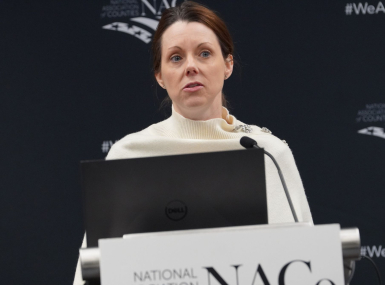White House Issues Executive Order Aimed at Improving Child Care and Long-Term Care Affordability
Author
Upcoming Events
Related News

Key Takeaways
On April 18, President Biden issued an Executive Order (EO) containing over 50 directives aimed at improving access to child care, early childhood education, long-term care and veteran care programs. While the EO does not require any new spending, the directives instruct executive branch agencies to expand accessibility by releasing clearer guidance on, lowering costs of and expanding eligibility for existing programs. Counties urge increased support and incentives for formal and informal caregivers and applaud our federal partners for its efforts to strengthen resources for this important population.
Highlights of the EO for counties include:
Child care and early childhood education: The EO directs the Department of Health and Human Services (HHS) to consider actions to reduce or eliminate families’ co-payments for child care through the Child Care & Development Block Grant (CCDBG), as well as raising Head Start teachers’ pay and the CCDBG reimbursements for child care providers. Counties administer the CCDBG program in 8 states and often serve as local Head Start Grantees.
Long Term Care: The EO directs HHS to leverage Medicaid funding to increase the home care worker workforce and condition Medicaid payments on how well nursing homes retain their workers. Additionally, HHS will pilot new respite care and family caregiver programs for dementia patients. Counties play an essential role in ensuring the health and safety of older Americans and individuals with disabilities as key administrators and fiscal contributors to Medicaid. Through 758 county-owned or operated long-term care facilities and community-based services, counties ensure that the more than 27 percent of adults age 65 and older, and the 61 million individuals with disabilities in the U.S. who require assistance to perform everyday activities, have the resources needed to live a long, healthy and independent life.
Veterans: The EO requires the Department of Veterans Affairs (VA) to expand its personal care assistance program to all 172 VA hospitals and their self-directed care programs to support thousands of new home care providers for veterans. As key service providers for veterans, counties engage in efforts to increase veteran caregiver support and raise awareness through the Elizabeth Dole Foundation's Hidden Heroes Cities and Counties Program.
The EO also commits the Departments of the Treasury, Defense, Agriculture, Labor, HHS, Education and Veterans Affairs as well as the Small Business Administration to engaging with care stakeholders, including parents, guardians, and other relatives with care responsibilities; individuals receiving long-term care; State and local care experts; care providers and workers; employers; and labor unions.
More detailed summaries of each action can be found in the White House’s press release.
NACo welcomes the administration’s efforts to increase access and affordability of care and to engage with key care stakeholders in implementing these plans. As crucial partners across the formal and informal caregiving sector, counties support federal and state action that will help us provide the resources needed to maintain caregiver health, well-being and financial security as they provide crucial life-sustaining support for our most vulnerable residents.
NACo will continue to monitor implementation of the EO.
Additional Resources
- The County Human Services and Education Landscape
- Counties for Kids
- NACo Policy Brief: Support the Child Care and Development Fund (CCDF)
- NACo Policy Brief: Fully Fund the Older Americans Act (OAA)
- NACo Report: The County Role in Long-Term Care
- NACo Blog: New Data from ACF Underscores the Significant Impact of Federal Investments in the Child Care System
- NACo Blog: ACL Releases 2022 National Strategy to Support Family Caregivers
- NACo Blog: House Introduces Bill that Would Increase Resources for Veteran and Military Caregivers
- NACo Blog: NACo Submits Comments to Senate HELP Committee on Healthcare Workforce Shortages
Resource
The County Human Services and Education Landscape

Related News

National Association of Counties Launches Initiative to Strengthen County Human Services Systems
The National Association of Counties (NACo) announces the launch of the Transforming Human Services Initiative, a new effort to help counties modernize benefits administration, integrate service delivery systems and strengthen county capacity to fulfill our responsibility as America’s safety net for children and families.

Congress seeking ‘common-sense solutions’ to unmet mental health needs
Rep. Andrea Salinas (D-Ore.): “Right now, it is too difficult to access providers … and get mental health care in a facility that is the right size and also the appropriate acuity level to meet patients’ needs.”

Federal-level child welfare priorities center on supporting foster youth, families
Child welfare experts outlined current priorities at the federal level, including better supporting foster care youth who age out of the system and recruiting more foster parents, at NACo’s Human Services and Education Policy Steering Committee meeting.
